There is an undeniable interest in 70’s retro occult rock at the moment but you cannot really lump Sabbath Assembly in with that glut. Theirs is more ‘cult rock’ and the cult is one at the forefront of things and goes way beyond the music itself. I have to say that the way the duo behind this group Jamie Myers and Dave Nus have concentrated on the teachings of The Process Church Of The Final Judgment as the backdrop of the project is a fascinating one. I was certainly intrigued to find out more of this unique act so spoke to Dave for further illumination.
AN: Firstly I wanted to ask why you decided on a change of personnel for this second album. Jex Thoth sang on your debut but here Jamie Myers more than capably replaces her. Is the line up now solidified or do you see it as something that is always going to be open for new contributors?
DN: One of the points about his band is that the personnel are not meant to be the central focus, but rather the hymns. The idea, although this is hard to capture for a rock act, is that the message of the songs can come through anyone who feels an authentic connection to the material, and thus the participants can come and go. Jex was wonderful to work with on the first album, but decided after our last tour that she would concentrate exclusively on her solo work. I agree that Jamie provides an excellent performance on the latest album, and the goal is for she and I to continue working together. The band is always open to new contributors who feel drawn to the material.
AN: What was it that got you so interested in The Process Church in the first place and why did you decide to embrace their teachings as a lyrical centre point?
DN: Having been raised in an evangelical Christian environment in South Texas in the 80’s, Satanic thrash metal was my true salvation. Psychologically split, I tried to stay loyal to both — to the derision of both sides. The Process theology of union of dark and light allows for one to walk of path of balance, observing the sacred in all things, practicing compassion, care and tenderness; as well as being a warrior, fearless, brave, and exacting. Satan and Christ become archetypes of these various aspects of ourselves that we can celebrate, rather than shame.
AN: As I understand it the main principle of the cult is that Satan will become reconciled to Christ and they will come together at the end of the world along with Jehovah and Lucifer to bring about the downfall of humanity, Christ as the judge and Satan as the executioner. Although the doomsayers with their ‘end of the world is nigh’ placards are a thing that is somewhat ageless, now seems the time with Mayan prophecies and everything else going on in the world that interest in this is again at a peak. What are your views on this and in respect to the teachings of the Church do you consider this could be the way things will pan out?
DN: You describe the primary unification principle of the Process well; this is the Processian myth that is told in the “Sabbath Asssembly” liturgy. But as with any great myth, the metaphorical meaning is more powerful than the surface reading, and the metaphorical meaning points directly at the “process” of our minds and how it mirrors the process of natural life cycles — and that is the inevitable cycle of birth and death. Only in being conscious of the Process can we observe and participate in it without frustration and attachment. We can make friends with the idea of our own demise, our impermanence. To me the Process Church were like the samurais of Christianity, constantly meditating on their own death.
I don’t have a specific comment on the 2012 situation, but I can say that it is helpful to consider always that all the facets of our lives that we cling to for meaning are absolutely transient; and in doing this, we confront what is the most deep-seated fear for many of us – our utter irrelevance. Of course, whether we are or are not irrelevant, the first step is in confronting it.
AN: Obviously we did not see the end of the world when the Process Church was operating in the 60’s and 70’s. One thing I do not know is why they actually ended things and how this happened. Was it disillusionment due to the fact that their ideas were not realised or was it just that they kind of all drifted apart? I believe their founder Robert DeGrimson’s militant leadership and group sexual practices may have helped lead to their downfall? 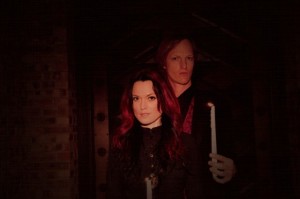
DN: I think this story is best told by an original Processian, and I can refer readers to Timothy Wyllie’s book LOVE SEX FEAR DEATH. Then again, I’m sure each member has his or her own individual account of why he or she left the group, with Timothy’s story being but one example. I wouldn’t think that the elusiveness of an earth-shaking Apocalypse would be a contributing factor. People seem willing to wait for the End of world for a long time. I imagine the sexual practices were fairly brutal on people’s psyches – and again more on that in Timothy’s book.
AN: How did you originally get in touch with ex members of the Church to get their involvement? I see there is even a Facebook page set up acting as a reunion group for putting past members in touch with each other, was it through this?
DN: No, I met with Timothy at a Book Expo in NYC just as his book was being released, and we hatched a plan for the Sabbath Assembly band at that time as a vehicle to share the beautiful hymns of the Process with the world. While these hymns had been performed many times in ritual context in the 60s and 70s, they had not been recorded because they were considered sacred rather than popular music.
AN: How receptive were they to the idea of working with you after all this time and how did you go about gaining their trust? I can only imagine that some would not want to dredge up the past and go into things again, perhaps some were even embarrassed about it having moved on with their life?
DN: I can honestly say that Timothy has been our primary connection to the Church and we have not reached out extensively to other members. Some have come out to performances and we’ve had passing relationships with them, but Timothy seems to have the largest emotional investment in the project.
AN: They gave you access to sacred liturgical texts I believe, unveiling them for the first time for you to use as lyrics. That must have been a great honour for you. Why do you think they did that here and now? Was it a question of completely trusting your intentions, do you think they felt that the time was right to make their ideas more available to those that would listen to your music?
DN: Now seems to be the prescient time to share this message with the world, which was evident to all involved by the way things fell into place quite simply to make the band happen; therefore moving ahead has felt safe. My role is just one small piece of the puzzle. Originally the involved parties had seen the band in the first batch of shows 3 years ago, bringing aspects of the liturgy to the public in the context of a book promotion tour for Timothy; even then I think there was an authenticity that was palpable.
AN: Another interesting point; would you say that any of the old members actually still have any of their old faith left, do any of them still think that such things could perhaps come to pass?
DN: I have not had the type of intimate conversations with former members that would reveal this, except for Timothy, and he would be happy to speak about this subject himself I’m sure.
AN: Would you say that the Church was very much a thing of the times? Do you consider that a cult of its kind could exist and gain widespread followers in the present period and do you consider that The Society Of Processeans, which exists today are a serious reformation of the cult?
DN: It’s hard to imagine how a cult of the kind that emerged throughout the 70’s could again formulate in the same way in the current age. So much of the way these groups formulated was by shrinking the worldviews of the members such that the life of the community became all-encompassing. In this day and age by contrast we have the world and the world of ideas at our fingertips, so the kind of myopia we see in 70’s groups seems unlikely.
I have not yet encountered the Society of Processians.
AN: I was interested to know how people perceived them when they were around. Were they looked upon as radical lunatics, dangerous brainwashers or were they accepted by people, the authorities and the media at the time?
DN: From my understanding, more the former – but again I can refer readers to Timothy’s book, or another new book by an original member, Sabrina Verney, called XTUL. This subject is well-discussed in both cases.
AN: One of the things that drew me instantly to your music was the involvement of Genesis P-Orridge. Obviously he has within Psychic TV referenced the cult quite liberally in the past and I think it is fair to say they have been a great inspiration on him and his ideas. Was this in a manner of speaking a role he was almost destined to play as High Priest(ess)? Did he take much persuading?
DN: I like your idea of destiny. Genesis was introduced to us through the publisher at Feral House, and was absolutely available to do the liturgical readings for the album without persuading. The Processian concept of unifying opposites is a huge part of Gen’s project, the merging of masculine and feminine, similar to the Processian unification of dark and light – which of course in Eastern paradigms is linked to gender.
AN: Did you work directly with him or was it via the Internet; I believe you are both based in NYC so guessing the former?
DN: Yes, we recorded together in Brooklyn.
AN: This leads nicely onto the music itself. Psychic TV oft describe themselves as Hyperdelic, a great word and one that suits them perfectly. If you were forced to describe Sabbath Assembly’s music how would you do so?
DN: “Devotional.”
AN: Tell us a bit about how the album came about, obviously you had the lyrics but what about the recording process, how long did this take.
DN: It was fairly quick; the time-consuming aspect was feeling how to incorporate the liturgical text in with the hymns in a way that wasn’t too heavy-handed. We know nobody likes to sit through church, but we’ve made a church-y kind of record, so how to keep that interesting and inspirational took a bit of soul searching.
AN: Musically it is very heady stuff and certainly is hymnal in sound. How did you go about making everything sound so authentic as far as both this and the fact it sounds just like it could be from the time the Church were about?
DN: We performed the liturgy with Genesis as high priestess and the band performing the hymns to the exact letter of how the service was written. The participants brought a lot of feeling to this, not as actors, but as believers. While we didn’t use all of the moments of this original rendition, it established source material that was delivered with authenticity.
AN: ‘The Love Of The Gods’ really sticks out and musically sounds familiar. Was it an original song of the Churches or your own composition?
DN: The first half of the song is from the Process, and we wrote the music for the second half to accompany Gen’s text. It ends the album to remind us that the Processian message is not all doom, but ultimately there is re-creation after destruction, a “conquering of fear with love” (their words, not ours).
AN: Where else do you take inspiration from when putting your music together?
DN: I rarely listen to music after 1974 so that gives you an idea.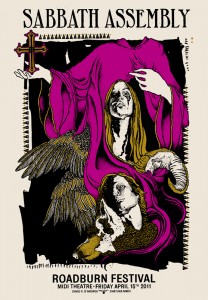
AN: What have reactions been like so far? Has anyone completely failed to get where you are coming from and has perhaps anyone gone as far as vilifying you for resurrecting the memory of an evil and deranged cult?
DN: Internally within the band there has been some concern about resurrecting a memory that may have been better left buried, and hence some of the turnover in the line-up. Our focus is on the theology but we are not intending to recreate a group and all start living in a communal house together, etc. Most of the reactions I have heard deal with the music and lyrical content directly, either in support of criticism for various reasons. Interesting that you mention “Love of the Gods;” one reviewer tore that track to pieces, and other friends had questioned the song “Exit” for similar reasons – because of the upbeat Christian campfire feel. What I hope people can understand is that nearly all of the Process hymns feel like that and we tend to darken them a bit, but with those two we just let the glory shine through.
AN: Musically I am struck by the simplicity of things which really allow for the gorgeous melodies to shine through but do you consider that anyone could, or even should just listen to this as background music without taking in the lyrics and the overall concept?
DN: Wow, I just wrote “shine through” without knowing you were going to use it in your next question, haha. Of course the intention is that people will hear the words, but on one level Sabbath Assembly is simply a rock band and if people want to appreciate the songs as songs that’s OK with us. Once they start singing along, however, they might notice that it’s not just “Babe, I’m Gonna Leave You.” Haha.
AN: I take it you do not play live that often. What would one expect from a Sabbath Assembly show? Any plans for the UK in the future?
DN: We want to play more and now we have a super booking agent in Germany who is helping us find shows for 2013. We had an incredible experience opening for Earth last year that included around 10 shows in the UK. I remember a day off we had in Wales exploring the countryside that was just lovely.
AN: Do you consider there is more you can do in this respect and more songs and albums to be recorded concerning the Church and its teachings? If not are there other such organisations that you would consider exploring?
DN: We will focus on the Process Church for now because there is much remaining to explore. I have a document compiling 500 pages of Processian texts so for the next album we may move from the liturgical to the philosophical. It’s an open question now, but yes we’ll stay with the Process.
AN: What is next on the cycle for Sabbath Assembly and are you involved in anything else musically at the moment?
DN: Sabbath Assembly is keeping life pleasantly full; it’s got 100% of my time.
AN: Thanks a lot for taking time to answer the questions and for one of the most thought provoking albums I have heard in a long time. Any final words for our readers?
DN: See you on tour in 2013!
Interviewed by Pete Woods

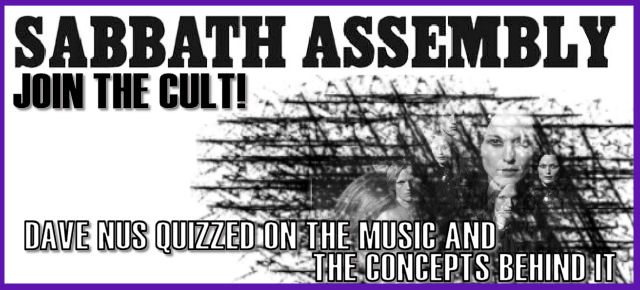

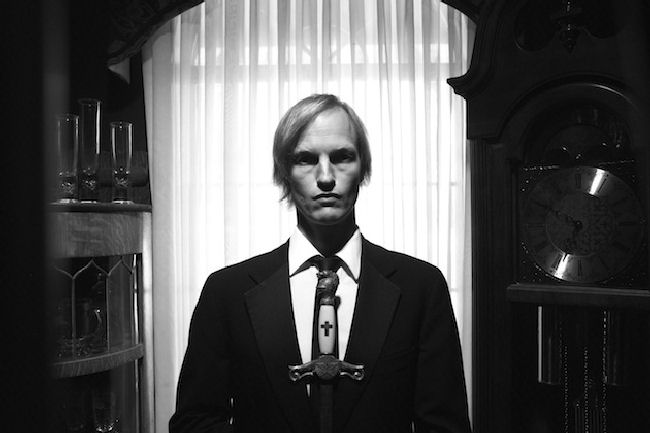
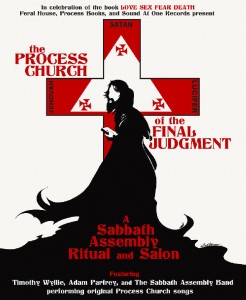
Leave a Reply